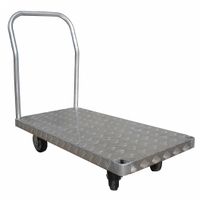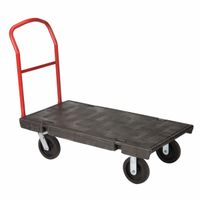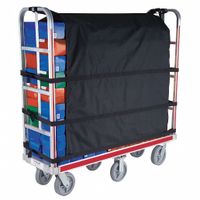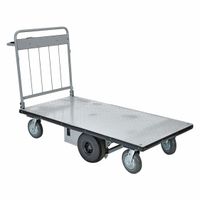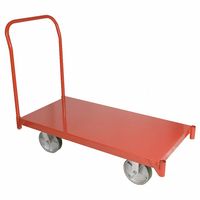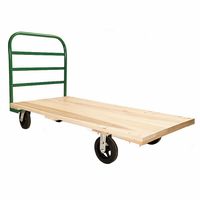Call +(254) 703 030 000 / 751 483 999 / 721 704 777
- Home
- Material Handling
- Transporting
- Carts Trucks
- Platform Trucks
.....Read More
Frequently Asked Questions
What are platform trucks used for?
Platform trucks are versatile material handling tools used primarily for transporting heavy or bulky items within warehouses, factories, retail environments, and other industrial settings. They consist of a flat platform mounted on wheels, often with a handle for easy maneuverability. These trucks are designed to reduce the physical strain on workers by allowing them to move large loads with minimal effort.
Key uses of platform trucks include:
1. **Material Transport**: They are ideal for moving raw materials, finished goods, or components between different areas of a facility, such as from storage to production lines or shipping areas.
2. **Loading and Unloading**: Platform trucks facilitate the efficient loading and unloading of goods from delivery vehicles, reducing the time and labor required for these tasks.
3. **Order Picking**: In retail and warehouse settings, platform trucks are used for picking and collecting items for customer orders, streamlining the order fulfillment process.
4. **Inventory Management**: They assist in organizing and relocating inventory within storage areas, making stocktaking and inventory management more efficient.
5. **Event Setup**: In event management, platform trucks are used to transport equipment, furniture, and supplies to and from venues, aiding in quick and efficient setup and teardown.
6. **Construction and Maintenance**: On construction sites or during maintenance activities, platform trucks help in moving tools, equipment, and materials, enhancing productivity and safety.
Platform trucks come in various sizes and weight capacities to suit different needs, and some models feature additional features like foldable handles, non-slip surfaces, or side rails for added safety and convenience. Their simplicity, durability, and ease of use make them an essential tool in many industries for improving workflow and reducing manual labor.
What materials are platform trucks made from?
Platform trucks are typically made from a variety of materials, each chosen for specific properties that suit different applications and environments:
1. **Steel**: Steel is a common material for platform trucks due to its strength and durability. It is often used in industrial settings where heavy loads are transported. Steel platform trucks can be powder-coated or galvanized to resist rust and corrosion.
2. **Aluminum**: Aluminum is lightweight yet strong, making it ideal for platform trucks that need to be easily maneuverable. It is also resistant to rust and corrosion, which is beneficial in environments where moisture is present.
3. **Wood**: Some platform trucks feature wooden decks, often made from hardwoods like oak or maple. Wood provides a sturdy surface and can be more forgiving on delicate items. It is typically used in combination with metal frames.
4. **Plastic**: High-density polyethylene (HDPE) or other durable plastics are used for lightweight platform trucks. Plastic is resistant to chemicals, moisture, and impact, making it suitable for environments where hygiene is important, such as food processing or pharmaceuticals.
5. **Composite Materials**: These are used to combine the benefits of different materials, such as the strength of metal and the lightweight nature of plastic. Composites can offer enhanced durability and resistance to environmental factors.
6. **Rubber**: While not used for the main structure, rubber is often used for wheels or bumpers to provide traction and protect against impacts.
The choice of material depends on factors like load capacity, environmental conditions, and specific industry requirements.
How do powered platform trucks work?
Powered platform trucks, also known as electric platform trucks or motorized platform carts, are designed to transport goods and materials efficiently within warehouses, factories, and other industrial settings. They operate using an electric motor powered by rechargeable batteries, which provides the necessary energy to move the platform and its load.
The basic components of a powered platform truck include a flat platform for carrying loads, a set of wheels for mobility, an electric motor, a battery pack, and a control system. The platform is typically made of durable materials like steel or aluminum to support heavy loads. The wheels are often equipped with rubber tires to ensure smooth movement and reduce noise.
The electric motor is the core component that drives the wheels. It is connected to a gearbox that adjusts the speed and torque, allowing the truck to move forward, backward, and turn as needed. The motor is powered by a battery pack, usually consisting of lead-acid or lithium-ion batteries, which can be recharged when not in use.
The control system includes a user interface, often in the form of a handle or joystick, which allows the operator to control the speed and direction of the truck. Some models may also feature advanced controls like programmable speed settings, safety sensors, and emergency stop buttons to enhance safety and efficiency.
Powered platform trucks are designed to reduce manual labor, increase productivity, and improve safety by minimizing the physical strain on workers. They are particularly useful for transporting heavy or bulky items over short distances, navigating tight spaces, and operating in environments where noise and emissions from traditional internal combustion engines would be problematic.
What are the benefits of using a steel-deck platform truck?
A steel-deck platform truck offers several benefits:
1. **Durability**: Steel is a robust material that can withstand heavy loads and harsh conditions, making it ideal for industrial and commercial environments.
2. **High Load Capacity**: Steel-deck platform trucks can carry substantial weight, making them suitable for transporting heavy equipment, machinery, or bulk materials.
3. **Longevity**: The strength and resilience of steel ensure a long service life, reducing the need for frequent replacements and lowering long-term costs.
4. **Stability**: The solid construction of a steel deck provides a stable platform, minimizing the risk of tipping or shifting during transport.
5. **Resistance to Damage**: Steel is resistant to impacts, abrasions, and other forms of physical damage, maintaining its integrity over time.
6. **Versatility**: These trucks can be used in various settings, including warehouses, factories, and construction sites, for a wide range of applications.
7. **Ease of Maintenance**: Steel surfaces are easy to clean and maintain, requiring minimal upkeep to keep them in good condition.
8. **Safety**: The sturdy design reduces the risk of accidents, and many models come with safety features like brakes and non-slip surfaces.
9. **Customization**: Steel-deck platform trucks can be customized with additional features such as side rails, handles, or specific wheel types to suit particular needs.
10. **Cost-Effectiveness**: While the initial investment may be higher than other materials, the durability and low maintenance requirements make steel-deck platform trucks cost-effective in the long run.
How do corrosion-resistant platform trucks differ from standard ones?
Corrosion-resistant platform trucks differ from standard ones primarily in their materials and construction, which are designed to withstand harsh environments and prevent degradation. These trucks are typically made from stainless steel, aluminum, or other non-corrosive materials, whereas standard platform trucks might use regular steel or other materials prone to rust and corrosion.
The choice of materials in corrosion-resistant trucks ensures longevity and durability, especially in environments exposed to moisture, chemicals, or salt, such as food processing plants, chemical factories, or outdoor settings. Stainless steel, for instance, offers excellent resistance to rust and chemical damage, making it ideal for maintaining hygiene and structural integrity.
Additionally, corrosion-resistant trucks often feature specialized coatings or finishes, such as powder coating or galvanization, which provide an extra layer of protection against environmental factors. These coatings help in preventing surface damage and maintaining the truck's appearance and functionality over time.
The design of corrosion-resistant trucks may also include sealed bearings and non-corrosive fasteners to further enhance their durability. These components are crucial in preventing the ingress of moisture and contaminants, which can lead to corrosion in standard trucks.
In terms of cost, corrosion-resistant platform trucks are generally more expensive than standard ones due to the higher quality materials and specialized manufacturing processes involved. However, the investment is often justified by their extended lifespan and reduced maintenance needs.
Overall, corrosion-resistant platform trucks are specifically engineered to perform reliably in challenging conditions, offering superior longevity and performance compared to standard platform trucks, which are more suited for general-purpose use in less demanding environments.
What are the advantages of plastic-deck platform trucks?
Plastic-deck platform trucks offer several advantages:
1. **Durability**: Made from high-density polyethylene or similar materials, plastic-deck platform trucks are resistant to dents, corrosion, and rust, making them suitable for various environments, including wet or corrosive conditions.
2. **Lightweight**: Plastic is generally lighter than metal, making these trucks easier to maneuver and reducing the physical strain on users. This can lead to increased efficiency and reduced risk of injury.
3. **Cost-Effective**: Typically, plastic-deck trucks are more affordable than their metal counterparts. They also require less maintenance, which can lead to cost savings over time.
4. **Non-Conductive**: Plastic does not conduct electricity, making these trucks safer to use in environments where electrical hazards are a concern.
5. **Chemical Resistance**: Plastic decks are resistant to many chemicals, oils, and solvents, making them ideal for use in industrial settings where such substances are present.
6. **Noise Reduction**: Plastic decks tend to produce less noise compared to metal decks when items are loaded or moved, contributing to a quieter work environment.
7. **Hygienic**: The smooth surface of plastic decks is easy to clean and sanitize, making them suitable for industries with strict hygiene requirements, such as food processing and pharmaceuticals.
8. **Customization**: Plastic can be molded into various shapes and sizes, allowing for customization to meet specific needs, such as adding non-slip surfaces or drainage holes.
9. **Environmental Impact**: Many plastic-deck platform trucks are made from recycled materials and are themselves recyclable, contributing to sustainability efforts.
10. **Aesthetic Appeal**: Available in various colors, plastic-deck trucks can be color-coded for organizational purposes or to match company branding.
How do wooden-deck platform trucks compare to metal-deck ones?
Wooden-deck platform trucks and metal-deck platform trucks each have distinct characteristics that make them suitable for different applications.
Wooden-deck platform trucks are generally lighter, which makes them easier to maneuver, especially in environments where frequent movement is required. The wood surface provides a natural grip, reducing the risk of items slipping during transport. This makes them ideal for moving delicate or irregularly shaped items that might be prone to sliding. Additionally, wooden decks are less likely to cause damage to the items being transported, as they are softer and more forgiving than metal surfaces. However, wooden decks can be susceptible to wear and tear, such as splintering or warping, especially in environments with high moisture or heavy use.
Metal-deck platform trucks, on the other hand, are typically more durable and can handle heavier loads. They are resistant to environmental factors such as moisture, making them suitable for outdoor use or in damp conditions. Metal decks are also easier to clean and maintain, which is beneficial in industries where hygiene is a priority, such as food processing or pharmaceuticals. However, metal surfaces can be slippery, especially when wet, and may require additional measures to secure loads. They are also heavier, which can make them more challenging to maneuver in tight spaces.
In summary, the choice between wooden and metal-deck platform trucks depends on the specific needs of the application, considering factors such as load weight, environmental conditions, and the nature of the items being transported.
